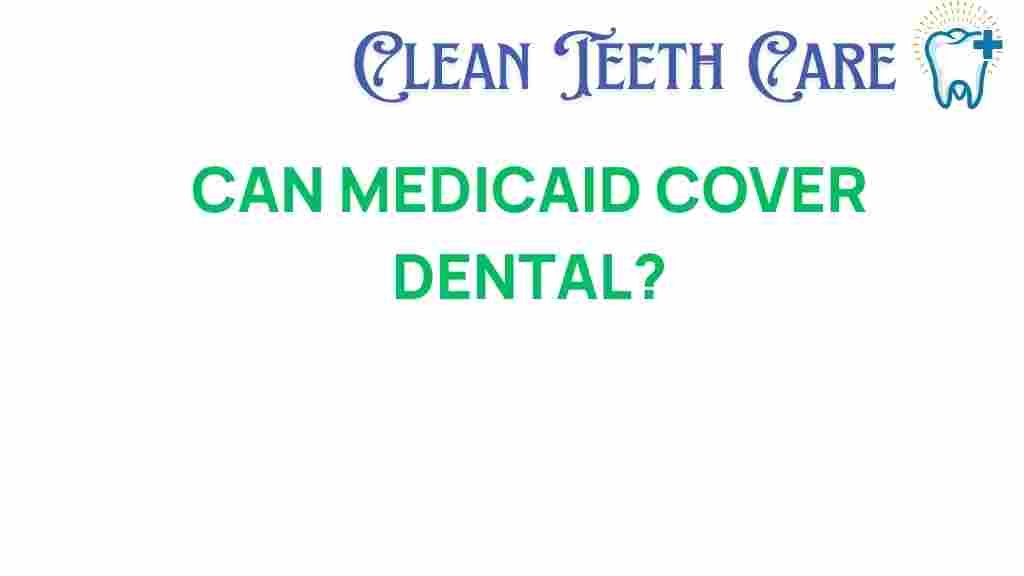Unpacking Medicaid’s Role in Dental Coverage: What You Need to Know
When it comes to healthcare, dental care is often an overlooked aspect of overall well-being. Many individuals, particularly those from low-income backgrounds, may struggle to access necessary oral health services. Medicaid, a government program designed to assist low-income individuals and families, plays a crucial role in providing dental coverage. This article delves into the intricacies of Medicaid’s dental benefits, eligibility requirements, and the importance of oral health for your overall health.
Understanding Medicaid and Its Importance
Medicaid is a state and federal program that provides health coverage to eligible low-income individuals. Its primary goal is to ensure that vulnerable populations, including children, pregnant women, elderly individuals, and those with disabilities, have access to necessary healthcare services. Medicaid also includes provisions for dental coverage, which is vital for maintaining good oral health.
What Does Medicaid Dental Coverage Include?
Medicaid dental coverage varies by state, but it generally includes a range of services designed to maintain and improve oral health. Common benefits include:
- Preventive Services: These include routine check-ups, cleanings, and fluoride treatments.
- Restorative Services: This encompasses fillings, crowns, and other treatments to restore damaged teeth.
- Emergency Services: Medicaid covers emergency dental services, which may involve treatment for severe pain or infections.
- Oral Surgery: In some cases, surgical procedures such as tooth extractions may be covered.
It’s essential to review your state’s specific Medicaid plan to understand the exact coverage available to you.
Eligibility for Medicaid Dental Coverage
To access Medicaid dental coverage, individuals must first meet certain eligibility criteria. These criteria can vary significantly from state to state, but generally include:
- Income Level: Applicants must demonstrate that their income falls below a specific threshold, often set at the federal poverty level.
- Age: Many states offer dental benefits primarily to children under the age of 21, though some provide coverage for adults as well.
- Residency: Applicants must be residents of the state in which they are applying for Medicaid.
- Citizenship: Generally, only U.S. citizens and certain legal immigrants are eligible for Medicaid benefits.
If you think you may qualify, it’s advisable to apply and explore your options. For more information on eligibility, you can visit the official Medicaid website here.
How to Apply for Medicaid Dental Coverage
Applying for Medicaid dental coverage involves several steps. Here’s a straightforward guide to help you navigate the process:
- Check Your Eligibility: Before applying, verify that you meet the eligibility requirements in your state.
- Gather Required Documentation: Collect necessary documents such as proof of income, residency, and identity.
- Complete the Application: You can apply online, by mail, or in person at your local Medicaid office. Make sure to include all required information.
- Await Approval: Once submitted, your application will be reviewed. You will be notified of your eligibility status.
- Select a Dental Provider: If approved, choose a qualified dentist who accepts Medicaid in your area.
Finding Dental Care Providers That Accept Medicaid
Not all dental providers accept Medicaid, so it’s essential to find one that does. Here are some tips for locating a dentist within the Medicaid network:
- Use Online Directories: Visit your state’s Medicaid website for a list of participating dental providers.
- Contact Medicaid: Call your local Medicaid office for assistance in finding a provider.
- Ask for Recommendations: Reach out to family, friends, or community resources for referrals to Medicaid-friendly dentists.
Common Barriers to Accessing Medicaid Dental Coverage
While Medicaid provides essential dental coverage, several barriers can hinder access to services:
- Limited Provider Availability: In some areas, there may be a shortage of dentists who accept Medicaid.
- Understanding Benefits: Many beneficiaries are unaware of the full range of dental services covered by Medicaid.
- Transportation Issues: Low-income individuals may face challenges in reaching dental appointments.
- Stigma and Misconceptions: Some may hesitate to seek care due to misconceptions about Medicaid or dental health.
Addressing these barriers requires community outreach, education, and advocacy to ensure that eligible individuals receive their dental benefits.
Importance of Oral Health and Its Impact on Overall Health
Oral health is a vital component of overall health and well-being. Poor oral health can lead to a range of issues, including:
- Heart Disease: Research shows a connection between gum disease and heart conditions.
- Diabetes: Individuals with diabetes are more susceptible to oral infections.
- Pregnancy Complications: Poor oral health can affect pregnancy outcomes, including low birth weight.
- Mental Health: Dental issues can impact self-esteem and lead to social anxiety.
By ensuring access to dental care through programs like Medicaid, we can help individuals maintain better oral health, which in turn supports their overall health.
Troubleshooting Common Issues with Medicaid Dental Coverage
Even with Medicaid dental coverage, beneficiaries may encounter challenges. Here are some common issues and tips for resolving them:
- Claim Denials: If your dental claim is denied, review the reasons and gather supporting documentation. Contact the dental office or Medicaid for clarification.
- Provider Referrals: If your dentist doesn’t accept Medicaid, ask for recommendations or look for a provider on your state’s Medicaid website.
- Confusion Over Benefits: If you’re unsure about what services are covered, contact your local Medicaid office for a detailed explanation of your benefits.
Conclusion
Medicaid plays an indispensable role in providing dental coverage to low-income individuals, ensuring they have access to essential dental care. Understanding the benefits, eligibility requirements, and the application process is crucial for maximizing these offerings. By prioritizing oral health and overcoming barriers to access, we can contribute to the overall well-being of our communities.
If you are interested in learning more about Medicaid and its benefits, please visit this comprehensive resource. Your oral health matters, and with the right information and resources, you can take charge of your dental care.
This article is in the category Treatments and created by CleanTeethCare Team
